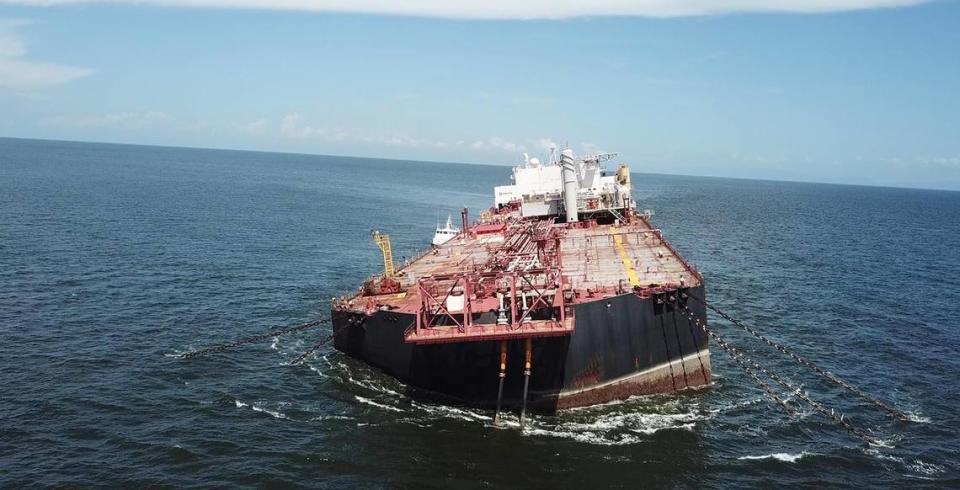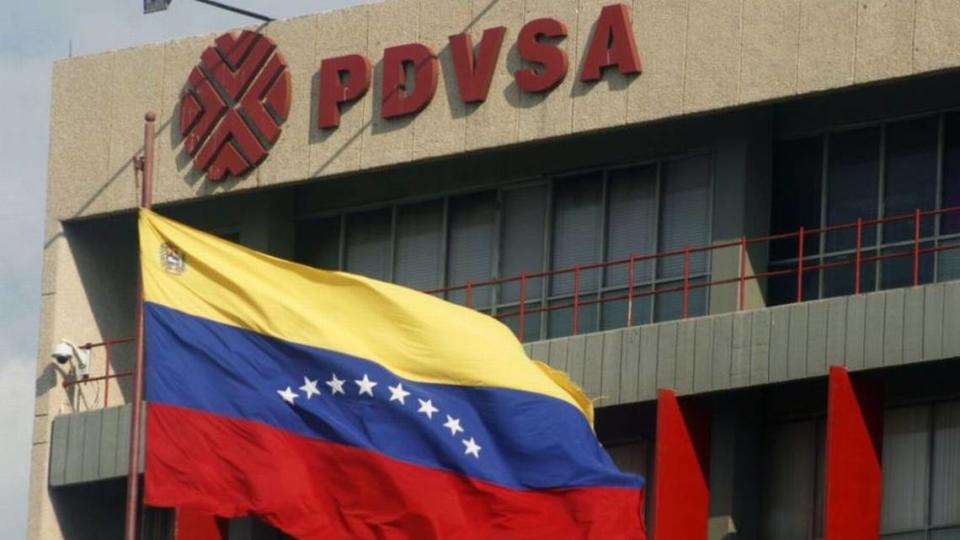An idle Venezuelan tanker with millions of gallons of oil is creating panic in Trinidad
More than 20 months after a Venezuelan oil tanker carrying nearly 55 million gallons of crude oil was abandoned off the country’s northern coast following tightened U.S. sanctions, inspectors from neighboring Trinidad and Tobago will finally get a chance to see for themselves if the idle vessel’s cargo could lead to a major ecological disaster off the Caribbean coast of South America.
Trinidad and Tobago’s energy and foreign ministers both confirmed to the Miami Herald that a team will head out Tuesday to visit the Venezuelan-flagged floating storage and offloading vessel Nabarima, which environmentalists say is taking on water and threatening to spill 1.3 million barrels of oil into the gulf between both countries.
The ship is in the Gulf of Paria, between Venezuela and Trinidad and Tobago.
While Nabarima is flying under a Venezuelan flag, it is operated by the Petrosucre company, a joint venture between the Venezuelan state oil company Petroleos de Venezuela, PDVSA, and the Italian Eni oil giant. After the Trump administration slapped sanctions on PDVSA in January 2019, Petrosucre stopped its oil extraction and the ship was left off the eastern coast of Venezuela with millions of barrels of crude oil.
Eventually, the ship fell into a state of disrepair, with the Reuters news agency reporting that a person familiar with the matter reported that it was undergoing repairs.

With recent photos showing the vessel dangerously tilting to the side, concerns over its possible capsizing have been growing. Trinidadian environmentalist groups had been unsuccessfully pressuring their government and Venezuelan leader Nicolás Maduro to do something about the ship, only to be told, according to one source, that U.S. sanctions against Venezuela had hamstrung efforts.
“The objective is to emerge with a report based on data and scientific observations focused on the safety and stability of the vessel and an assessment of any potential risk of environmental damage,” Trinidad Foreign Affairs Minister Amery Browne said. “Whilst we recognize that the vessel in question belongs to Venezuela and is located in Venezuelan waters, the government of Trinidad and Tobago has been consistently using all available diplomatic channels to press for this inspection opportunity on behalf of the many concerned people of our country, and as part of our commitment to do everything in our power to help safeguard the marine environment.”
Browne and Trinidad Energy Minister Franklin Khan said the inspection team’s report will guide immediate next steps.
On Monday, Reuters reported that the Nabarima was now upright, according to a group of Trinidadian fishermen, and PDVSA is planning to discharge the crude via ship-to-ship transfer.
The lack of transparency over the ship and what has been described as “foot dragging” by Trinidad and Venezuela over an inspection has frustrated Trinidadians.
“Nobody knows what exactly is happening on the boat. Is the boat really sinking? Are the Venezuelans really repairing it? Can they repair it on time?” said Anthony Gonzales, the former head of the Institute of International Relations at the University of the West Indies in Trinidad. “We are waiting to see what will eventually happen. In the meantime, there is panic on this side because we are concerned we are the ones who will most likely be affected.”
The amount of oil on the Nabarima is more than what was on the Exxon Valdez when it spilled 11 million gallons of crude into Alaska’s Prince William Sound on March 24, 1989, making it the worst oil spill in U.S. history until the explosion on the Deepwater Horizon oil rig on April 20, 2010. That spill released over 130 million gallons of crude oil that covered 1,300 miles of the U.S. Gulf Coast and caused the deaths of an estimated 800,000 birds and 65,000 turtles.
“Can you imagine what kind of destruction [the Nabarima] would do on the coast of both countries?’” Gonzales said. “It’s an area where people do a lot of fishing. ... The cleanup would be massive and I don’t know if we’re equipped to handled that because we have never had that kind of experience.”
Gary Aboud, the corporate secretary of Trinidadian environmental group Fishermen and Friends of the Sea, said at least 50,000 Trinidadian fishermen who depend on the Gulf of Paria for their livelihood would be affected should the Nabarima spill oil into the sea.
Aboud said that until now, the government had showed no urgency in trying to avert what would be a disaster five times worse than the Exxon Valdez. He noted that while Prime Minister Keith Rowley was able to welcome Venezuela Vice President Delcy Rodriguez to Port-au-Spain for a visit in April, the government seemingly couldn’t get clearance to inspect the ship.
“Certainly you shouldn’t be telling Trinidad and Tobago that for 72 days you’ve been unable to get clearance for experts to go in and examine an environmental catastrophe that is about to happen,” Aboud said. “We feel betrayed and abandoned by our government.”

Leading up to Tuesday’s scheduled visit, Fishermen and Friends of the Sea had written several letters including to Trinidadian government officials, the ambassadors from the U.S. and Venezuela, and the European Union ambassador to Trinidad. While they appealed to the U.S. ambassador to relax the sanctions against Venezuela, the group asked the EU ambassador to intervene directly with Eni, the Italian company that has a 26% stake in the venture, and to have them share with Trinidad what they were doing about securing the ship.
Recently, representatives of the group said they flew out to the ship and took photos showing the vessel floating at a 25 to 30 degree tilt. On the same day of the visit, Aboud said Venezuelan Ambassador Carlos Amador Perez Silva refuted the claim, sharing photos in the Trinidadian press that showed the ship was not tilting and not in danger of capsizing.
“He produced false pictures. They were probably taken sometime before, that showed the vessel was stable,” Aboud said. “We think that as an ambassador that was reprehensible and dishonest.”
Perez did not respond to an email from the Miami Herald seeking a response .
On Friday, the U.S. Embassy in Port-of-Spain urged immediate actions to prevent any potential oil spill in the gulf. In a statement, the embassy said it was concerned about the potential environmental risk the ship posed to nearby countries. The embassy also said that U.S. sanctions imposed on Maduro and PDVSA have no bearing on “activities addressing safety, environmental, or humanitarian concerns.”
“We strongly support immediate actions to bring the Nabarima up to international safety standards and avoid possible environmental harm, which could negatively impact not only the Venezuelan people but also those in nearby countries,” the embassy said. “PDVSA has a responsibility to take action to avoid an environmental disaster in Venezuelan waters.”

 Yahoo Finance
Yahoo Finance 